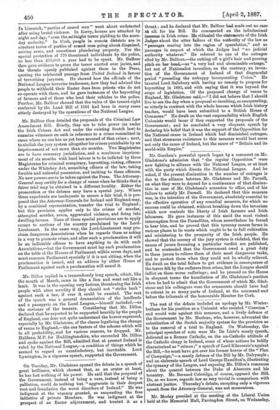Mr. Balfour then detailed the proposals of the Criminal Law
Amendment Bill. Briefly, they are to take power (as under the Irish Crimes Act and under the existing Scotch law) to examine witnesses on oath in reference to a crime committed in cases where no one has as yet been accused of that crime ; next, to abolish the jury system altogether for crimes punishable by an imprisonment of not more than six months. Two Magistrates are to have summary jurisdiction, and a maximum imprison- ment of six months with hard labour is to be inflicted by these
• Magistrates for criminal conspiracy, boycotting, rioting, offences under the Whiteboy Act, assaulting officers of the law, taking forcible and unlawful possession, and inciting to these offences. No new powers are to be taken against the Press. The Attorney. General may certify for a change of venue when he thinks that a fairer trial may be obtained in a different locality. Either the prosecution or the defence may have a special jury. Where these expedients are inadequate to secure a fair trial, it is pro- posed that the Attorney-Generals for Ireland and England may, by a combined representation, transfer the trial to England ;
• but this provision applies only to the crimes of murder, attempted murder, arson, aggravated violence, and firing into dwelling-houses. None of these special provisions are to apply except to sections of the country proclaimed by the Lord- Lieutenant. In the same way, the Lord-Lieutenant may pro. claim dangerous Associations when he regards them as acting in a way to promote crime, and after such a proclamation it will be an indictable offence to have anything to do with such Associations,—but the Government must lay such proclamation on the table of the Houses of Parliament within seven days, and must summon Parliament specially if it is not sitting, when the proclamation is issued, and an address by either House of Parliament against such a proclamation will annul it.


































 Previous page
Previous page